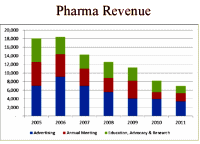APF Convenes Unique Pipeline Summit
With the pharmaceutical industry weary of investing in psychiatric drug development, collaboration across public and private sectors seems to be the only way to remedy a dearth of new treatments.
Psychiatric News
by Jun Yan
April 06, 2012
They are concerned that psychiatry is facing a prolonged drought of no new drugs for years to come. One by one, major pharmaceutical companies have slashed or abandoned neuropsychiatric research programs. “There are huge unmet clinical needs in mental disorders and addiction,” said Jeffrey Lieberman, M.D., incoming president-elect of APA and chair of psychiatry at Columbia University, who moderated the morning session. “There should be tremendous interest in this area, but there is not.” Psychiatric research and development programs have gained a high-cost, high-risk, and no-return reputation in industry after dozens of failed programs, agreed senior managers from several major companies at the summit…After a number of expensive failures in recent years, companies have shifted resources to anti-inflammatory and oncology development, which are perceived as less risky and more profitable. Atul Pande, M.D., senior vice president of Neurosciences MDC at GlaxoSmithKline [GSK], recounted his involvement in the termination of 14 early-stage clinical programs on new drugs investigated for several psychiatric indications. “Not a single one of them generated a shred of positive data,” he said. Each failure means a multimillion-dollar loss for the company. Subsequently, GSK decided to curtail its neuroscience research. Two senior members from venture-capital firms confirmed that this sense of pessimism about neuropsychiatric research has influenced investors as well. Investment dollars are flowing toward oncology and other diseases and are down some 70 percent over the past few years…
 The impact on psychiatry is not simply the empty pipeline. For example the Pharma Revenue of the APA [right] has fallen steadily over the last five years to a third of its former level. The stream of Pharma money has declined in all areas, and will continue to dry up as the drug patents expire. Likewise, lucrative research grants, clinical trials, and employment on advisory boards, speaker bureaus, etc are disappearing. Organized and academic psychiatry have thrived in alliance with Pharma, and the drought impact will be significant.
The impact on psychiatry is not simply the empty pipeline. For example the Pharma Revenue of the APA [right] has fallen steadily over the last five years to a third of its former level. The stream of Pharma money has declined in all areas, and will continue to dry up as the drug patents expire. Likewise, lucrative research grants, clinical trials, and employment on advisory boards, speaker bureaus, etc are disappearing. Organized and academic psychiatry have thrived in alliance with Pharma, and the drought impact will be significant.
At the root of the failed initiatives is murky and incomplete understanding of the physiology of mental illnesses, summit participants agreed. Finding the right physiological targets to halt or reverse pathology is at the heart of drug development. In psychiatry, “[a] lot of drug targets [that were] validated in the lab have not panned out in clinical trials,” said Armin Szegedi, M.D., Ph.D., who heads the Clinical Neurosciences and Ophthalmology Department at Merck. The reason? Psychiatric disorders are not single-pathway diseases. For example, what is known as major depressive disorder may be a heterogeneous group of diseases with different etiologies and genetic factors, he said. Targeting one pathway may not help patients with other pathologies, and no one yet knows how to differentiate patients by their biology.
Psychiatry, The Pharmaceutical Industry, and The Road to Better Therapeutics
by H. Christian Fibiger
Schizophrenia Bulletin. 2012 38(4):649–650.
In order to recapture industry’s investment in psychiatric drug development, major changes in psychiatry will need to take place. These changes are necessary along the entire value chain, including both preclinical and clinical domains. What the field lacks is sufficient basic knowledge about normal brain function and how its disturbance underlies the pathophysiology of psychiatric disease. Because of this, as the record now clearly shows, it remains too early to attempt rational drug design for psychiatric diseases as currently conceived. The most obvious solution here is expanded investment in neuroscience. By necessity, this will be driven primarily by the efforts of clinical and basic scientists in academic settings because industry no longer has the appetite or the resources to engage in such activities…A major barrier to progress is the current state of nosology in psychiatry. A new taxonomy is a prerequisite for meaningful progress. Today, few would argue that syndromes such as schizophrenia and depression are single, homogeneous diseases. And yet when it comes to clinical research, including clinical trials, both are still almost always treated as such. For example, studies continue to be published on the genetics of both of these syndromes despite the fact that there never will be a robust genetics of either condition as the nature and severity of specific symptoms are too heterogeneous across individuals to have any consistent genetic correlates. Similarly, while DSM conceptualizations of psychiatric disease may have utility in current clinical practice, when it comes to research, they too are a barrier to progress…
Pharma’s complaint about the very lack of solid neuroscience that they opportunized on is hardly the only paradox on the current field of play. Tom Insel of the NIMH has been a tireless advocate for basic neuroscience research before all other. Indeed, the NIMH has been the traditional source of funding for that kind of basic research. The NIMH has even initiated a program to create a new classification system based on the findings of neuroscience rather than behavior – the RDoC [Research Domain Criteria]. Where is the paradox? In spite of a stated commitment to basic research, the NIMH has funded a string of very expensive drug trials – CATIE, STAR*D, CO-MED, TADS, etc. The list is quite long. And as mentioned previously, the NIMH can’t get enough of Translational Science – the idea of streamlining the process of getting the findings of basic research to clinical medicine – getting drugs to market. We even have a new Translational Science Center in the NIH headed by Dr. Insel himself. Now, Translational Neuroscience has been redefined to also include medication development:
| from the NIMH Director’s Blog by Dr. Tom Insel
|
|
Without the large budget and the scientific expertise for medication development, how can NIMH compensate for the pharmaceutical industry’s shift in focus? Is it appropriate for NIMH to invest public dollars in an area that many pharmaceutical companies have deemed too risky for investment?
Treatment Development: The Past 50 Years, December 14, 2011
For NIMH, the problem is clear. Research over the past decade has shown that our current medications are not good enough. Industry has had blockbusters but very few breakthroughs in the past forty years. There was always hope that the billions of dollars invested in this area by the pharmaceutical industry would result in more effective treatments for our most disabling disorders. Now, however, we face the possibility that there will be no next generation of mental disorder treatments emerging from industry.
Treatment Development: Where do we go from here? January 5, 2012
Can NIMH afford to invest its public funds in medication development? Can we afford not to?
Experimental Medicine June 12, 2012
|
So in spite of championing the role of the NIMH in basic research, Insel’s NIMH has long been into the business of drug efficacy throughout his tenure, and now he’s adding drug development to the mix. That’s the paradox.
 Behind every paradox is a perfectly rational explanation. Psychiatry redefined itself as a biological medical specialty with a descriptive nosology and psychopharmacological evangelism as its therapeutic cry. For thirty years, the current generation of psychiatrists have sustained themselves on the available medications and the promise of future discovery, future treatments – mainly psychopharmacology. The medicalized psychiatry, armed with its DSM revisions, embraced the term evidence-based medicine as if it were its own invention rather than a borrowed term. The upper levels of psychiatry supported their departments, their research, their organizations, and too often themselves through a symbiotic relationship with the pharmaceutical industry. And the pharmaceutical industry in turn thrived in the relationship with obscene profits. There was the illusion that the stream of new agents would iterate towards a greater efficacy [and would never end].
Behind every paradox is a perfectly rational explanation. Psychiatry redefined itself as a biological medical specialty with a descriptive nosology and psychopharmacological evangelism as its therapeutic cry. For thirty years, the current generation of psychiatrists have sustained themselves on the available medications and the promise of future discovery, future treatments – mainly psychopharmacology. The medicalized psychiatry, armed with its DSM revisions, embraced the term evidence-based medicine as if it were its own invention rather than a borrowed term. The upper levels of psychiatry supported their departments, their research, their organizations, and too often themselves through a symbiotic relationship with the pharmaceutical industry. And the pharmaceutical industry in turn thrived in the relationship with obscene profits. There was the illusion that the stream of new agents would iterate towards a greater efficacy [and would never end].
The pipeline of drugs was an illusion, just molecular variations on a few monotonous themes playing with the relationship of efficacy and adverse effects. The scientific basis of the diagnostic system is turning out to be an illusion as well [to the horror of the DSM-5 Task Force]. The drugs are not a great deal more useful than the ones we had – just better tolerated and with different side effects. There have been a number of advances in neuroscience, but surprisingly few that have much clinical relevance. Creative research has been swallowed up by the directed research of the modern era. And the traditional knowledge and skills of psychiatrists have withered in the face of the current psychopharmacological evangelism. The merger of psychiatry and industry has produced a rich broth for scientific and fiscal corruption, and we’ve seen way too many examples over these years.
Why am I in mind of a bunch of fleas after their host has died?
A reality TV show has to figure in here somewhere… Just might be some therapeutic value in the entertainment with very little risk of adverse reactions!
Dependency, boy is withdrawal a bitch, eh? Money and power are the real detriments of addiction in this society. Leaders just don’t want you behind the curtain, ’cause truth can really bring down the party.
Can’t medicate life. Watch out for that catchphrase in the future.
All that is needed is to create a few more psychiatric diseases. Then Pharma can re-invent their drugs again. Can you think of any up and coming ones? I did think that ‘irrational disobediance’ was a good candidate til I discovered ODD DID exist. Any thoughts? (Not bad ones please)
Nick, pharma was hoping it would be able to sell prophylactic drugs for Alzheimer’s. Imagine the fabulous profits, and who was going to complain of side effects if you could avoid Alzheimer’s? But that line of research didn’t turn out so well….
Everyone loves what you guys tend to be up too. This sort of
clever work and exposure! Keep up the great works guys I’ve included you guys to my personal blogroll.